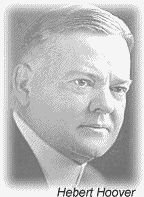September 11, 2003
Smoot-Hawley Ghosts Should Terrify Investors
By Brady Willett & Todd Alway
 More than 1,000 economists signed a petition urging President Hoover to veto the bill…but to no avail.
More than 1,000 economists signed a petition urging President Hoover to veto the bill…but to no avail.
Signed into law on June 17, 1930, the Smoot-Hawley bill – which raised import duties by as much as 50% - did little to stop the U.S. economy from sinking into depression. In fact, it is generally accepted that Smoot-Hawley exasperated the downtrend in the U.S. economy that began in August 1929. What is not as accepted – or at least not as publicized – is that the stock market crash in October 1929 and subsequent entrenchment of the U.S. economy is what enabled the Senate to attract the final few votes needed to pass Smoot-Hawley.
More than 70-years later and a Smoot-Hawley like aura is raising its head. This time, however, politicians are not seeking to give the U.S. economy a boost by enacting geographically wide-ranging tariffs (save those on Steel), but by attacking one country: China. The bipartisan Senate effort – telling the story that China’s ‘manipulation’ of currency prices is costing American jobs – aims to slap a 27.5% tariff on imported Chinese goods.
Jobs Lost Are Profits Gained
That U.S. jobs are being shifted to places like China can hardly be debated. To be sure, of the companies we have researched for possible inclusion in the Wish List – Steinway and Husky to name two - many are planning to set up new operations in China. In the case of Steinway there is little doubt that U.S. jobs will be lost when, and if, operations are moved.
Even so, the alternative to companies not shifting production to places where labour is cheaper is not necessarily a rosy one. For example, if Steinway raises its profits after moving to China then the lost income from American workers could be partially recovered. By contrast, if Steinway closes U.S. plants because a foreign competitor is simply too price competitive, the benefits to the American economy would be essentially nil.
Such is the type of complex situation that arises not only on a company to company basis, but when looking at the global economy as a whole. The United States, clearly upset on one level that China will not allow its currency to rise, is, on another level, benefiting from a pegged Yuan (more profits for the Wal-Marts).
Retaliation All That Can Be Guaranteed
As mentioned recently in the Hashimoto Factor, a major threat to the U.S. economy – and particularly the U.S. dollar – is that Asian central banks decide (perhaps taking a retaliatory stance) that they do not want to purchase more U.S. assets and/or that they want to sell what assets they already own. Given that a bill has just been introduced which aims to tax Chinese imports, the concept of retaliatory acts by Asian central banks seems topical. To be sure, we have a difficult time believing that China will stand idly by while the U.S. enacts a 27.5% tariff. In fact, it can and should be generally accepted that such a tariff would provoke a response.
Taking a quote from the Canadian Prime Minister at the time of Smoot-Hawley’s passage is, perhaps, apropos:
“How many thousands of American workmen are living on Canadian money today? They've got the jobs and we've got the soup kitchens? I will not beg of any country to buy our goods. I will make [tariffs] fight for you. I will use them to blast a way into markets that have been closed.”
Campaign speech - Richard Bedford Bennett. Elected Prime Minister of Canada in 1930 (quoted in O’Brien).
That the United State’s largest trading partner and (even at the time) longtime ally would make such an inflammatory statement raises the question of just how far an ideological rival (as China is on many levels) would go. Rather than a game of tit-for-tat, an escalating stance of one-upmanship is a distinct possibility.
Smoot-Hawley did little to energize the U.S. economy in the 1930s. In fact, there are some who believe that politicians working towards Smoot-Hawley precipitated the U.S. stock market crash. We don’t lend much credence to this theory – especially since the gullible investing public piled into stocks (investment trusts) for suspect reasons and fled the markets probably unaware that Smoot-Hawley existed. Nevertheless, the theory that tariffs can negatively impact investor confidence is worth mentioning:
“As soon as dealers in securities, who were constantly on the watch for indications as to business conditions, realized that this feeling of uneasiness (on account of the tariff bill) was spreading throughout industry, they began selling stocks.”
Fred Kent, Director of the Bankers' Trust Company. November, 1929.
This week’s proposed bill is unlikely to pass. Indeed, Sen. Jim Bunning – arguing “It's a shot across the bow” - suggested that the bill is tantamount to a bargaining chip. Yet as Smoot-Hawley ghosts flicker into view, the context under which tariffs become an acceptable policy instrument should not be forgotten. Smoot-Hawley, planned for by President Hoover during his campaign, was not finally brought to bear until the U.S. economy sunk into severe recession. Similarly, if the United States continues to lose manufacturing jobs, and as politicians seek remedies for reelection, more pressure will invariably be put on China to revalue – or else. Could 10,000 economists soon be writing a petition and sending it off to President Bush not to enact a Smoot-Hawley tariff against China? The very idea that this is possible should make investors tremble. As for the repercussions of a Chinese response, they are unlikely to be limited to the investment world.
http://www.eh.net/encyclopedia/obrien.hawley-smoot.tariff.php
http://www.ncpa.org/oped/bartlett/oct2999.html
S.1586: http://thomas.loc.gov/cgi-bin/query/C?c108:./temp/~c1082DYdSO
Search: http://thomas.loc.gov/home/c108query.html
a